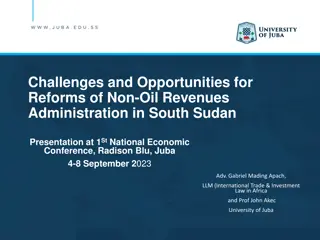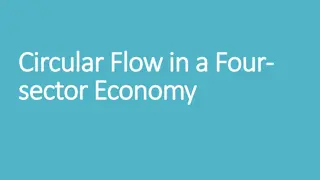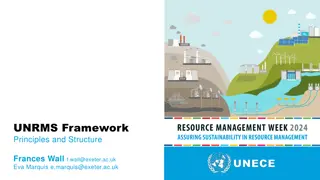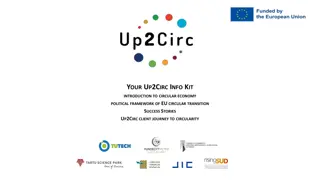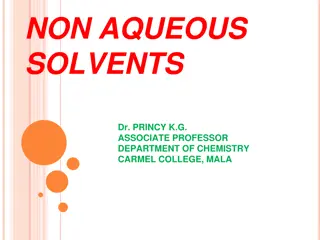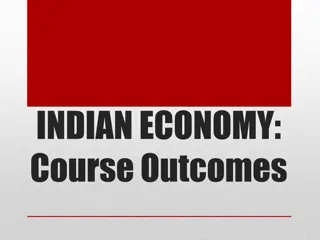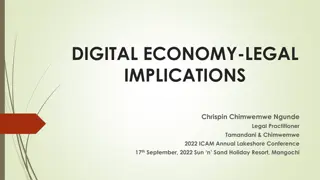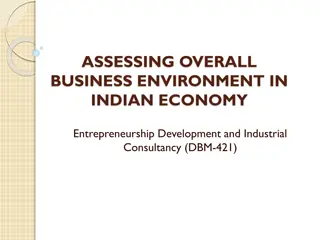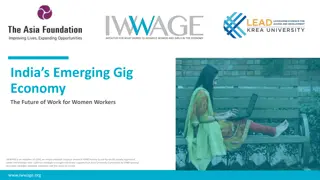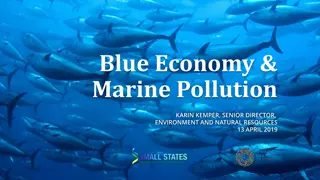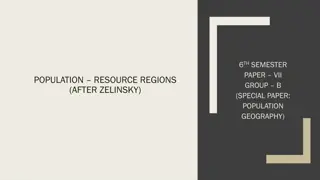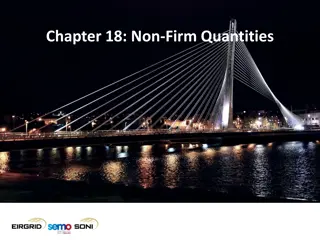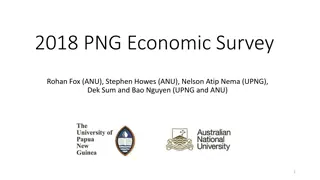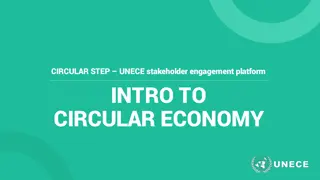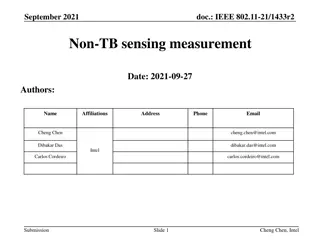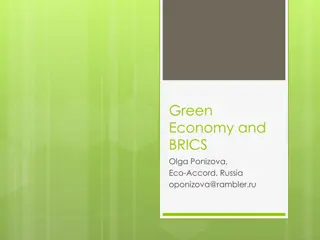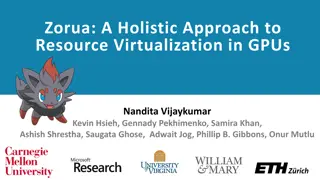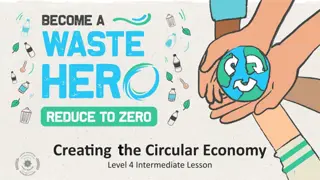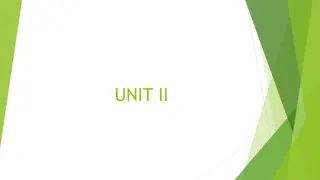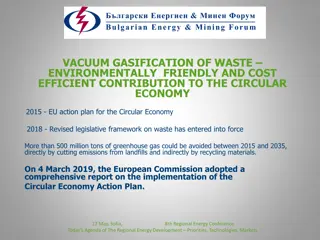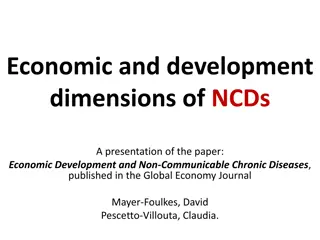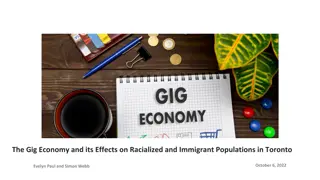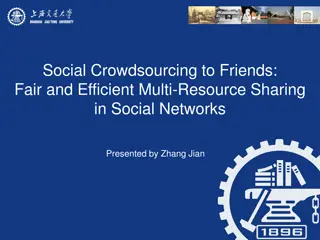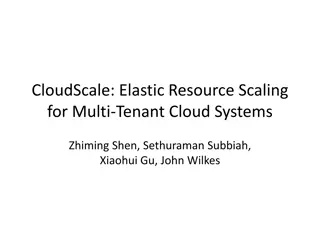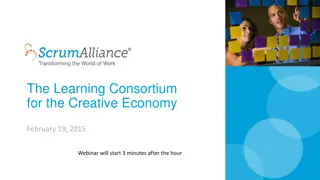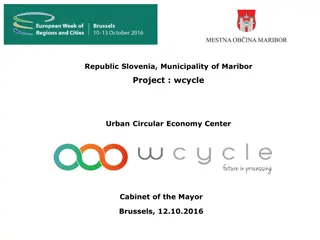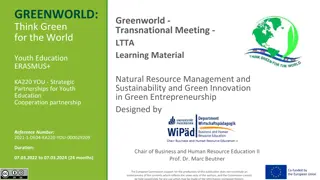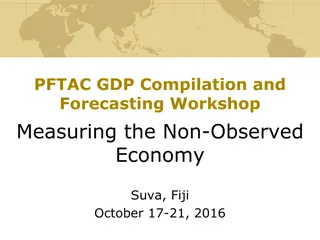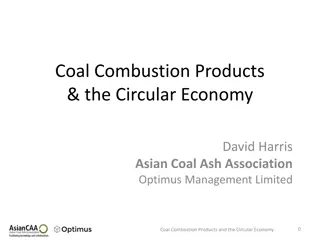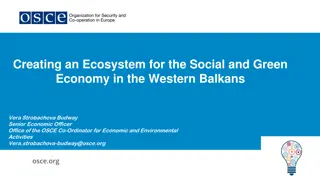Sustainability and the Blue Economy Concepts
The intertwining concepts of sustainability and the blue economy, focusing on historical developments, environmental protection events, and the emergence of sustainability science. Discover the pillars supporting a sustainable blue economy and pathways for inclusive development.
15 views • 40 slides
Efficient Resource Mobilization and Management Strategies by Dr. Abraham Maliet Mamer
This content discusses efficient resource mobilization and management strategies, emphasizing the importance of understanding the typical cycle of resource regime, defining resources, identifying resources, and mobilizing resources effectively. It provides insights into resource allocation methodolo
1 views • 12 slides
Challenges and Opportunities for Reforms of Non-Oil Revenues Administration in South Sudan
The presentation highlights the reliance on oil revenues in South Sudan and the need for reforms in non-oil revenue administration. It discusses sources of non-oil revenue, factors hindering revenue mobilization, and opportunities for reforms to diversify the economy. The objectives of non-oil reven
3 views • 23 slides
Circular Flow in a Four-Sector Economy Explained
The circular flow in a four-sector economy involves households, firms, government, and the foreign sector. Each sector plays a crucial role in money flows and payments, contributing to the continuous flow of income. The financial market also has a significant impact on the economy by accumulating sa
3 views • 8 slides
Glossary of Key Terms
Explore essential terms in economics such as command economy, consumer, demand, economic system, free enterprise system, goods, innovation, market economy, marketplace, mixed economy, needs, producer, profit, resources, scarcity, services, supply, technology, trade-off, traditional economy, and want
3 views • 6 slides
Comprehensive Overview of UNRMS Framework and Principles
UNRMS (UN Resource Management System) aims to promote sustainable resource management globally through innovative frameworks and principles. It encompasses various natural resources and supports sustainability at different scales. Stakeholders can use it to assess projects against environmental, soc
5 views • 10 slides
Accelerating Towards a Circular Economy Future
The circular economy presents a vital solution to tackle climate change by focusing on regenerative growth, reducing resource consumption footprint, and enhancing material use efficiency. The EU's Circular Economy Action Plan aims to usher in a sustainable future through decoupling economic growth f
2 views • 19 slides
Leveraging Non-Oil Exports for Nigeria's Blue Economy Growth
Nigeria Export Promotion Council (NEPC) focuses on diversifying Nigeria's economy by promoting non-oil exports for sustainable growth. The Blue Economy concept involves sustainable use of ocean resources for economic development. Nigeria's abundant ocean resources such as maritime transportation, fi
0 views • 20 slides
Understanding Non-Aqueous Solvents: Types and Classification
Inorganic non-aqueous solvents play a crucial role in chemical research and industry. This article by Dr. Princy K.G. delves into the classification of solvents based on protonicity, polarity, and aqueous vs. non-aqueous nature. It explores the types of non-aqueous solvents, such as protonic and non
1 views • 29 slides
Understanding Indian Economy: Course Outcomes and Resources
Explore the course outcomes of the Indian Economy, covering economic development, policies, population growth, planning, agriculture, Kerala's economy, and resources for further study. Access government data and publications on the Indian economy for comprehensive learning.
0 views • 9 slides
Legal Implications of the Digital Economy in Malawi
Explore the legal implications of the digital economy in Malawi as discussed at the ICAM Annual Lakeshore Conference. Topics include the Electronic Transactions and Cyber Security Act, principles of implementation, Malawi CERT, data privacy, and the significance of the digital economy in transformin
0 views • 44 slides
Overview of Modern Business Environment in Indian Economy
Modern business in the Indian economy is characterized by large size, oligopolistic nature, diversification, global presence, technology orientation, and changing government regulations. The Indian economy features a mixed economy with both private and public enterprises, low per capita income, uneq
0 views • 14 slides
Insights into India's Thriving Gig Economy and Future Work Trends
India's gig economy, spearheaded by initiatives like IWWAGE, is reshaping the future of work, particularly for women. Key questions revolve around the gig economy's impact, legislative frameworks, and COVID-19 repercussions. Academia investigates the rise of gig work, focusing on platforms like Uber
0 views • 11 slides
The Blue Economy and Marine Pollution: A Comprehensive Overview
The presentation outlines the thriving ocean economy, the concept of the Blue Economy, the World Bank's approach, risks faced by oceans, and the impact of marine pollution on Small Island Developing States and coastal regions. It emphasizes sustainable development of oceanic activities, collaboratio
1 views • 12 slides
Population Resource Regions and Zelinsky's Classification
Geographers have long studied the relationship between population growth and resource adequacy, leading to the concept of Population Resource Regions (PRR) by W. Zelinsky. Zelinsky identified five types of PRR based on population-resource ratios, ranging from Type A with high resource utilization po
0 views • 8 slides
Understanding Non-Firm Quantities in Electricity Markets
Non-Firm Quantities in electricity markets involve units with non-firm access not being compensated for their non-firm capacity not getting accommodated on the system. The concept of Firm Access Quantity plays a key role in determining compensation levels for units, with differences in implementatio
0 views • 6 slides
Understanding Non-Compete Agreements: Enforceability and Requirements
Non-compete agreements are commonly used in the United States to protect businesses from competition by former employees. To be enforceable, these agreements must meet certain requirements, including independent consideration, protection of legitimate business interests, and reasonableness in scope,
0 views • 26 slides
2018 PNG Economic Survey: Analysis and Recommendations
The 2018 PNG Economic Survey conducted by a team of experts highlights the challenges faced by the non-resource economy in Papua New Guinea. The report emphasizes the need for policy actions to stimulate growth, address foreign exchange shortages, and boost employment. Data indicates a recession in
0 views • 44 slides
Introduction to Circular Economy and UNECE Stakeholder Engagement
Explore the concept of Circular Economy focusing on reducing, reusing, recycling, and recovering materials for economic sustainability and environmental quality. Learn about UNECE's role in promoting circular economy principles, stakeholder engagement, and activities aimed at sustainable resource ma
0 views • 4 slides
Comparison of Trigger-based vs. Non-Trigger-based Sensing Measurement in IEEE 802.11
The document discusses the differences between Trigger-based (TB) and Non-Trigger-based (Non-TB) sensing measurement instances in IEEE 802.11 standards, focusing on who initiates the sensing measurement. TB sensing is initiated by the AP, while Non-TB sensing is initiated by a non-AP STA, enabling o
6 views • 13 slides
Insights into Social Economy and Social Dialogue Research Outcomes
Research outcomes from the Mesmer+ project at HIVA KU Leuven reveal misalignments in social dialogue inclusiveness, challenges faced by social economy entities, and the role of employers in the social economy. Recommendations include enhancing the role of social economy employers and promoting inclu
1 views • 7 slides
Exploring the Green Economy and BRICS Cooperation
The discussion focuses on the importance of the green economy for BRICS nations, suggesting ways for collaboration, especially in addressing climate change and transitioning to a low-carbon economy. The BRICS countries play a crucial role in global stability and sustainable development. Features of
0 views • 22 slides
Enhancing Academic Success Through Family Resource Centers
The Department for Family Resource Centers and Volunteer Services (DFRCVS) consists of two divisions: Family Resource and Youth Services Centers (FRYSC) and Serve Kentucky. FRYSC aims to assist academically at-risk students by addressing non-cognitive and non-academic barriers to learning. These sch
0 views • 15 slides
Zorua: A Holistic Resource Virtualization in GPUs Approach
This paper presents Zorua, a holistic resource virtualization framework for GPUs that aims to reduce the dependence on programmer-specific resource usage, enhance resource efficiency in optimized code, and improve programming ease and performance portability. It addresses key issues such as static a
0 views • 43 slides
The Impact of Collaborative Economy on Employment and Social Security in the EU
The European Parliament Committee on Employment and Social Affairs explored the effects of business models, including the platform economy, on employment and social security in the European Union. The collaborative economy, involving service providers, users, and intermediaries, creates opportunitie
0 views • 10 slides
The Impact of Pandemics on the Shadow Economy Performance
Pandemics have a significant impact on the shadow economy, influencing the legal economy in various ways. The shadow economy serves as a buffer for high unemployment rates and can contribute to budget revenues through legal spending. Studies suggest that a growing shadow economy may reflect dissatis
0 views • 12 slides
Exploring Circular Economy Business Models
Discover the principles of circular economy through images and descriptions of linear vs. circular economy, various business models of circularity, and examples like product life extension, sharing platforms, and resource recovery. Dive into case studies highlighting waste reduction, regeneration of
0 views • 14 slides
Evolution of Services Marketing in the Modern Economy
The shift towards a service economy has transformed marketing practices, leading to the emergence of Services Marketing as a distinct discipline. This evolution highlights the unique characteristics of services, such as intangibility and simultaneous production-consumption. The 1980s mark a pivotal
0 views • 13 slides
Vacuum Gasification of Waste: A Step Towards a Circular Economy
Vacuum gasification of waste is a cost-efficient and environmentally friendly solution contributing to the circular economy. The EU has set targets for recycling and reducing landfill waste, aiming to avoid millions of tons of greenhouse gas emissions by 2035. The transition from a linear to a circu
0 views • 14 slides
Economic Development and Non-Communicable Diseases: Analyzing the Impact
This paper explores the economic dimensions of Non-Communicable Diseases (NCDs) such as alcohol, tobacco, junk food, and lack of exercise, which are largely preventable factors affecting economic development. Key concepts like unwholesome goods, demand and supply irrationality, and market power are
0 views • 22 slides
Understanding the Impact of the Gig Economy on Marginalized Groups in Toronto
This report delves into the effects of the gig economy on racialized and immigrant populations in Toronto. It outlines research findings, stakeholder insights, and strategic recommendations to address the challenges faced by marginalized groups in the gig economy. The study aims to shed light on the
0 views • 25 slides
Fair and Efficient Multi-Resource Sharing in Social Networks
This paper explores the concept of fair and efficient multi-resource sharing in social networks, presenting a credit market-based framework for charge-free computing resource sharing. It addresses the challenges of escalating data volumes and the need for collaborative resource allocation strategies
0 views • 21 slides
CloudScale: Elastic Resource Scaling for Multi-Tenant Cloud Systems
CloudScale is an automatic resource scaling system designed to meet Service Level Objective (SLO) requirements with minimal resource and energy cost. The architecture involves resource demand prediction, host prediction, error correction, virtual machine scaling, and conflict handling. Module 1 focu
0 views • 37 slides
The Learning Consortium for the Creative Economy Webinar Summary
The webinar on The Learning Consortium for the Creative Economy discussed key topics such as agenda details, presenters' backgrounds, poll results, and insights on the Creative Economy and its importance. Participants engaged in discussions on topics like the Recap on the Creative Economy, Scaling o
0 views • 43 slides
Maribor Circular Economy Project: Transitioning Towards Sustainable Waste Management
The Maribor wcycle Urban Circular Economy Center project aims to revolutionize waste management by implementing circular economy principles, focusing on waste recovery, recycling, and sustainable resource utilization. The project's strategic objectives include reducing environmental impact, increasi
1 views • 10 slides
Greenworld: Natural Resource Management, Innovation, and Sustainability in Entrepreneurship
This transnational meeting focused on youth education in the context of natural resource management, green innovation, and sustainable entrepreneurship. Participants explored challenges in resource consumption, sustainable entrepreneurship opportunities, examples of eco-innovation, and the significa
0 views • 18 slides
Understanding the Non-Observed Economy in GDP Compilation
The non-observed economy, including informal and illegal activities, poses challenges in GDP compilation, affecting growth rates and international comparability. Comprehensive coverage and terminology are vital to address these issues. The size of the informal economy in the Pacific region and globa
0 views • 21 slides
Coal Combustion Products & the Circular Economy - Addressing Resource Flow Challenges
This discussion delves into the intersection of coal combustion products and the circular economy, emphasizing the need for continuous re-evaluation of resource chains, ecosystem metabolisms, and industrial innovations to ensure sustainable environmental practices and economic growth. Exploring the
0 views • 24 slides
Advancing Social and Green Economy in Western Balkans
Creating an ecosystem for social and green economy in the Western Balkans is crucial for fostering peace, reducing disparities, and promoting sustainable business models. Initiatives like promoting innovation, job creation, and skills development among young entrepreneurs are key to driving growth a
0 views • 7 slides
Understanding and Implementing Non-Drug Therapies for Pain in Older Adults
This resource provides information on the role of direct care workers in identifying and addressing pain in older adults, funded by The SCAN Foundation. It covers misconceptions about non-drug approaches to pain, various non-drug therapies like physical positioning and music, and tips on when to use
0 views • 47 slides


